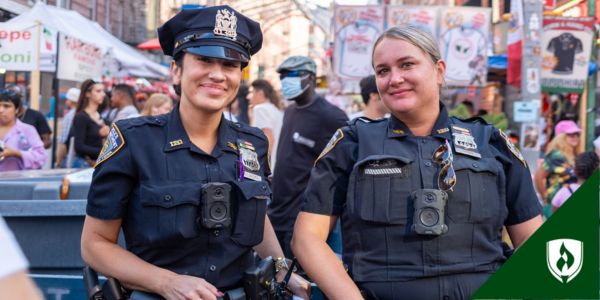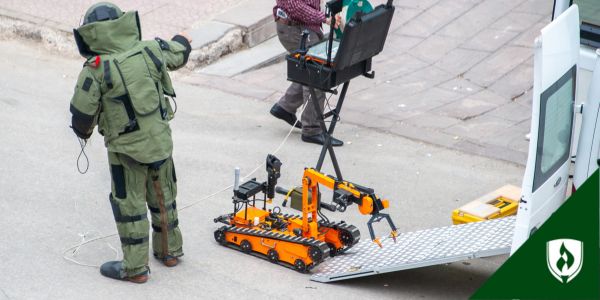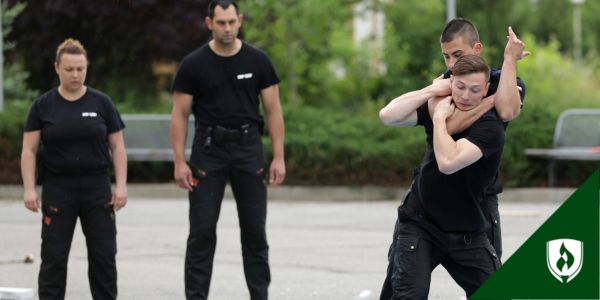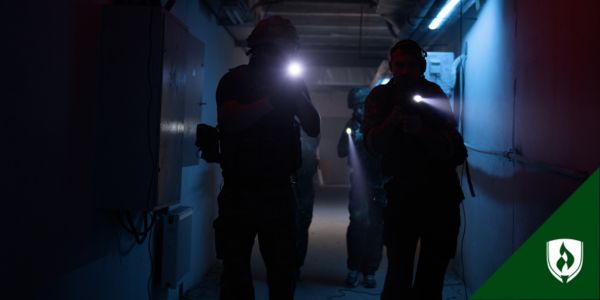Officers Reveal 9 Things They Wish They Had Known Before Joining the Police Force
By Brianna Flavin on 09/30/2019
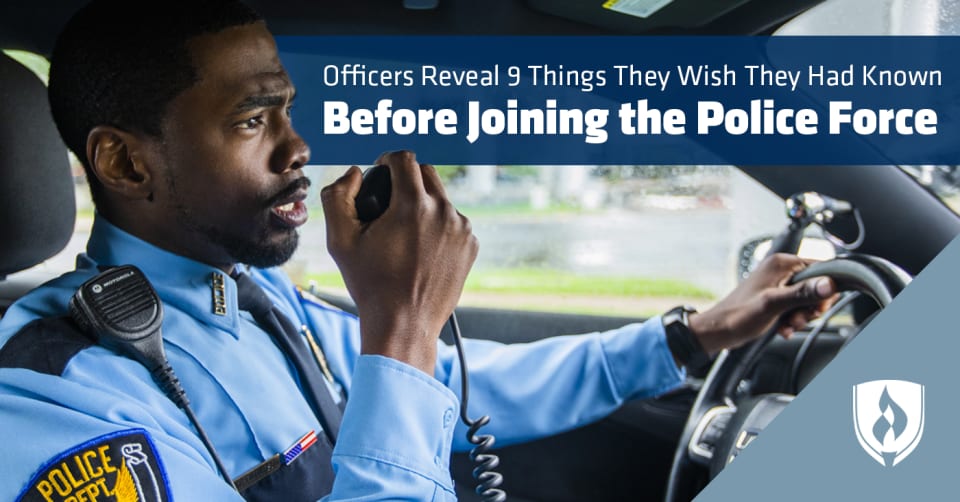
If you’ve ever thought about joining the police force, that thought was likely followed by a barrage of questions. Can I do some good here? Will I be safe? Is a career as a police officer anything like I think it would be?
And that’s a good thing! Becoming a police officer is no frivolous decision. “It’s such an honor to be trusted with the safety and security of our fellow citizens,” says retired Lieutenant Brian McKenna. “It takes an extraordinarily high level of commitment to fulfill that responsibility well.”
If you’d like a closer look at what joining the police force would really mean, read on! We asked police officers to weigh in on what they wish they had known before their first day on the police force.
Before joining the police force, I wish I had known …
1. How serious this responsibility would be
While it’s fair to say most aspiring police officers have an understanding that this is a job that is not to be taken lightly, McKenna says the true weight of his responsibilities wasn’t always his first consideration going into this career.
“I had decided on a career in law enforcement because I thought it would be exciting,” McKenna says. “Even though I liked the idea of helping people, it was car chases, dangerous calls, and arresting bad guys that really appealed to me.” But McKenna says it didn’t take long for him to feel the weight of the job.
“Everything I did was no longer the actions of a young, rather naïve college kid, but the actions of a real police officer with the power to take away someone’s liberty or even, in extreme cases, their lives.” McKenna says the job became scarier after that, but it also became more of an honor and a reason to invest extra effort into doing things the right way.
2. That communication skills would matter more than any other skill set
When you picture “police officer skills,” you probably don’t picture talking. But according to Paul Grattan, a sergeant and 17-year veteran of a large metropolitan police department in New York, communication is perhaps the most important skill.
“New recruits need to understand that their communication skill set will be used far more often than any other skill they develop,” Grattan says. “Physical tactics are an essential part of policing, but how we communicate influences virtually every single interaction we will have—positively or negatively.” Grattan says most agencies train their recruits in communication, but could really use even more training and emphasis on the crucial topic.
“I wish new officers would understand from day one that being a good cop has everything to do with being a good communicator,” Grattan says.
3. To value additional training
“Looking back, I realize now that I never appreciated policing as a profession rather than a job,” Grattan says. “I balked at training opportunities during the early part of my career and never paid much attention to ancillary opportunities.”
Grattan explains that optional training and professional development opportunities are worth your time, especially if you start to think about policing the way other professions think about their careers. Whether it’s training outside of your agency, mentorships, interagency partnerships, formal educational opportunities or scholarships—take advantage of these offerings early on.
4. How much there is to learn
Police TV shows are all about booking criminals, studying crime scenes and sitting on stakeouts, but McKenna says the subject areas police officers might encounter are growing. “Cops now need training in various nonlethal weapons, crisis intervention, race relations, emergency trauma care, response to active shooters, terrorism, new and more dangerous drugs, and more,” McKenna says.
“Today there are also opportunities in technology—especially in computers and forensics—and social media that didn’t exist before. And there are expanding opportunities in media/public relations, crisis intervention, human relations, communications, and training.”
McKenna says there are even initiatives now that would allow police officers to move their careers into a direction of education—training citizens in emergency preparedness, especially with regard to active shooter or other catastrophic situations.
“Many of these options will probably be part-time positions supplemental to the officers’ regular duties, but they will help officers for promotions to traditional assignments like detectives, community policing, and gang, anti-crime and other specialized units.”
5. That there’s no formula to fit most situations
In school, you learn a variety of approaches to scenarios you might encounter as a police officer. But in real life, the complexity of each situation means you have to always engage in critical thinking and adjust your approach to meet each encounter.
“One of the most important lessons I learned in my first year or so is that gaining cooperation or compliance is more art than it is science,” Grattan says. “I think one of the first things new officers learn when they hit the streets is that every situation is unique, and no two personalities are the same. This means there is no boilerplate approach to anything in law enforcement.”
6. To network
“A lot of professions preach the value of networking from day one, but I never heard this same advice shared among those in law enforcement,” Grattan says. But as in any field, networking can have a huge impact on your career and your happiness.
Like any other professional, police officers need people they can rely on, look to for advice and connect with for a new initiative or any number of job-related needs. “I now see networking as absolutely essential to a productive and rewarding profession,” Grattan says.
7. To read about what others are doing in the field
Why rely on trial and error when you can learn from what others have learned? Grattan says he learned over time not to reinvent the wheel. “It pays to look at what other officers and agencies have done. Personally, I’ve embraced the evolution of evidence-based policing, and have relied heavily on research and science to craft policy and approaches that are grounded in research rather than conjecture.”
8. To find a mentor
Much like networking, mentorship is another area where police officers could really use the support a more traditional career might offer. A mentor may not have all the answers, but they can certainly provide some excellent tips and advice for navigating a challenging career. “I wish I would have had a mentor earlier in my career who could have taught me the value of building a foundation to become a good investigator, supervisor, or a better trained and well-rounded patrol officer,” Grattan says.
9. To commit to your mental and emotional health
“A lot of police work is relatively easy,” McKenna says. “But there are times when an officer cannot afford to make any mistakes. Their life, or the lives of others, can be put on the line at any time with little or no forewarning.” Unsurprisingly, that can take a real toll on your mental health and emotional well-being.
Officers who go into the job with support networks, a therapist, a spiritual community or any other place they can go for help will be much better prepared to face the hardships of the job before they hit a crisis point.
“It takes enormous commitment to stay emotionally, legally and spiritually healthy,” McKenna says. “While also mentally and physically [healthy] to do the job up to the standard the public has every right to expect.”
Have hopes of joining the police force?
Becoming a police officer takes work and commitment. As you can see, this job is far from easy. But people who understand the responsibility of role can find a career as a police officer deeply satisfying.
If these insights have you excited or at least curious about what it takes to join the police force, check out our article “How to Become a Police Officer: Your Step-by-Step Guide.”
The Criminal Justice program at Rasmussen University has not been approved by any state professional licensing body and does not lead to any state-issued professional license. In Minnesota, the Criminal Justice Associate’s degree program does not meet the standards established by the Minnesota Peace Officer Standards and Training Board for persons who seek employment as a peace officer.
Related Articles:

